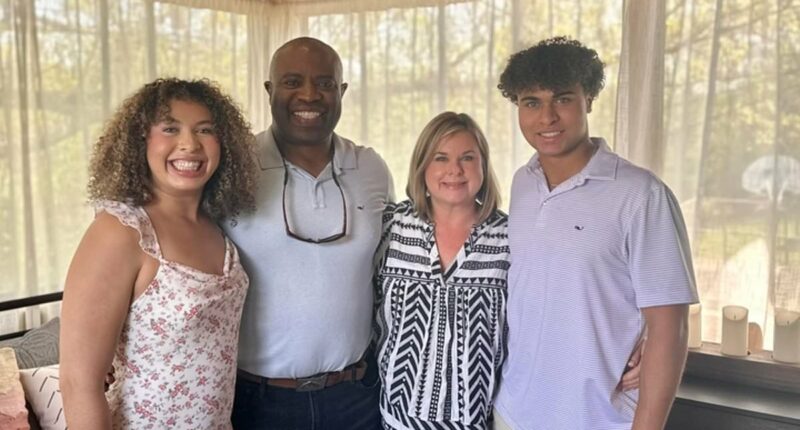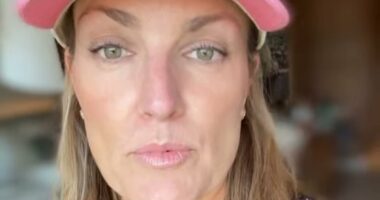Share this @internewscast.com
Families in Kentucky are raising alarms over the proliferation of AI-generated obituaries after discovering false information about their deceased sons circulating online.
One such case involves Brett Tinch, who found himself having to correct misleading details about his 18-year-old son Noah, following a tragic fly-fishing accident that claimed the young man’s life.
“I started seeing these posts and none of the information was accurate,” Brett shared with WKYT. “The middle name was wrong. There’s one out there that says he’s 32 years old.”
Noah, a sophomore at the University of Kentucky, was just a day shy of his 19th birthday on June 12, during a visit to Colorado with his mother.
The family explained that Noah was helping his grandparents prepare their property for sale and was attempting to teach his mother the art of fly fishing—a passion of his.
Tragically, on the second day of their fishing excursion, Noah’s mother, Angie Tinch, discovered him unresponsive in less than three feet of water, as reported by the Lexington Herald-Leader.
She performed CPR on her son until emergency crews arrived and pronounced Noah dead at the scene.
It is now believed he had gotten a fly stuck on a rock and slipped when he went to go pick it up, hitting his head and losing consciousness before he drowned.

Noah Tinch, 18, died in a freak fly fishing accident on June 12

His family said shortly after his death, they found fake obituaries for him online
Brett Tinch told WKYT he was not planning on sharing the harrowing details but he knew the best way to fight these fake obituaries was by telling the truth about his son’s death.
Some, he noted, were asking for money – and even though the family had set up an online fundraiser, the money was going to support Noah’s efforts to help children without means attend soccer camps and even maybe set up a scholarship for future defensive players.
‘I don’t want to see anyone profit off our son’s pain,’ Brett said.
The same thing happened to Dena Weedman, she told WDRB, as she shared her frustration with the scammers.
‘I don’t know who would want to do something like that,’ she said.
Weedman’s son, Dylan Bryant, died on August 12 at the age of 30 after battling addiction.
‘He was all about his family and his mother was his biggest fan,’ Weedman said.
‘He shared a special bond with his sister. He was loved,’ she continued. ‘I mean, his funeral was huge, he had a lot of people there. He was only 30.’
But the scammers saw his death as a way to profit.

The same thing happened to Dena Weedman, she told WDRB, as she shared her frustration with the scammers

Weedman’s son, Dylan Bryant, died on August 12 at the age of 30 after battling addiction
Weedman explained that just days after her son’s passing, a friend showed her a fake obituary for him on a random website.
Bryant’s death date and photo were correct, but Weedman said almost everything else was fake.
‘None of this is true,’ she insisted. ‘He was not an avid car person. He didn’t know how to barely change oil. He didn’t pass away in a tragic car accident.
‘He was not married.’
The post also included a link to a fundraiser asking for money Weedman said the family did not need.
‘A fundraiser has been set up to cover cremation, towing and other costs with the remaining funds going towards his son’s need,’ the fake obituary read, according to WDRB, which found at least four fake obituaries for Bryant – each containing different false details about his life.
Websites and Facebook pages, some of which operate overseas, publish hundreds of fake memorials, often scraping information from legitimate obituaries or social media posts.
According to tech company SecureWorks, scammers monitor Google searches for popular obituaries and then post mock memorials on the sites to make money from ads or fake security alerts. Some even use pop-ups designed to steal personal information.
There are no repercussions for any false information they publish.
‘It’s an unfortunate situation and the last thing a family wants to deal with when a loved one has passed,’ Dr Lisa Blue, director of artificial intelligence strategies for Eastern Kentucky University told WKYT.
‘The family’s best strategy is to be proactive and control the narrative by posting an obituary on an official news site, or a platform, or a funeral home website as soon as possible, asking their friends and loved ones to only share that content,’ she advised.
For Weedman, that means telling the public how important it is that her son be remembered for who he really was: ‘The light of our whole family – the funny one, the joking one.’
















